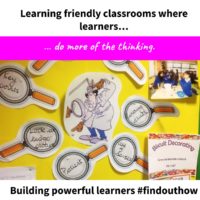What do we mean by Reasoning?
Reasoning—the kind of logical, analytical, explicit disciplined thinking that schools often focus on. There is a lot of interest at the moment in ways of teaching thinking, and such ‘Show your working’ kinds of thinking are a very important part of the good learner’s toolkit, although not the be-all and end-all of learning. In fact, research suggests that secondary schools have not been very successful at developing students’ ability to think logically in real life.
It turns out to be quite difficult to free any kind of thinking or learning skill from its ties to the particular setting and subject matter in which it was originally practised.
Nevertheless, being able to construct logical arguments or make practical use of Venn diagrams, for example, is very useful, and good learners need practice at using such tools in the context of their real-life concerns.
A well formed Reasoning habit involves being ready, willing, and able to:
- Resist jumping to conclusions;
- Seek justifiable evidence to shape sound, well-honed arguments;
- Scrutinise your assumptions;
- Seek evidence and counter evidence, look for false steps and carefully draw conclusions;
- Remain suspicious, doubting and self-doubting in order to avoid unwarranted certainty;
- Convey your logical thinking clearly, through dialogue, symbols, analogies, prose and pictures.
So, at a less abstract level, students need to learn the inclination to resist impulsive responses; to respond logically and thoughtfully; to apply logic by explaining, justifying and, ultimately, proving what they think; to utilise a range of reasoning tools; and to develop strategies for presenting their reasoning to others persuasively. When looked at from these diverse angles growing reasoning moves well beyond encouraging a student to ‘think it through’.
Spot the Reasoners in your classes
Just to get you tuned in – have a quick think about ‘Reasoners you may know’. Make a note of students you know who display these characteristics. Becoming a teacher who develops students’ learning power means developing a keen awareness of the subtleties of your students’ learning behaviours.
What do you think?
- How many of your students come to mind when looked at through the lens of reasoning?
- Is there a gender balance or have you noted down more girls than boys or vice versa?
- Are the students you have noted from across all age groups or do some dominate?
- How do these reasoning characteristics help these students to be better learners?
Make a note of…
- Those groups or classes that seem to have lots of good reasoning characteristics.
- How you think you might capitalise on this.
A reasoning activity for any subject
Sequencing
Cut up;
- a cartoon,
- series of pictures of a production process,
- a flow diagram,
- a mathematical proof,
- a story line,
- a musical score,
- a poem,
- a sequence of events, and so on.
Invite students to reassemble the pieces in what they think is a viable order and explain their reasons for this. Model and listen for the language of reasoning to strengthen the process. [Lift the level of challenge by omitting one or two of the pieces, or by including a red herring or two, or by interleaving two sequences that need to be separated before the sequencing can be completed.]



Some of our nursery children have become thinkers, each individual has their own things that they enjoy and will spend time trying to figure out what to do for example : teddy empties the puzzle on the floor he spreads out the pieces he looks at the pictures and starts to try and piece them together but struggles as he is rushing and trying to get it right, i watch to see what he does he shouts i cant do this, i offer my help by giving him ideas and ways he could try to put the pieces together. Teddy spends the whole morning until hes completed the jigsaw i supported him by saying ‘ don’t give up keep on trying using the ideas suggested,